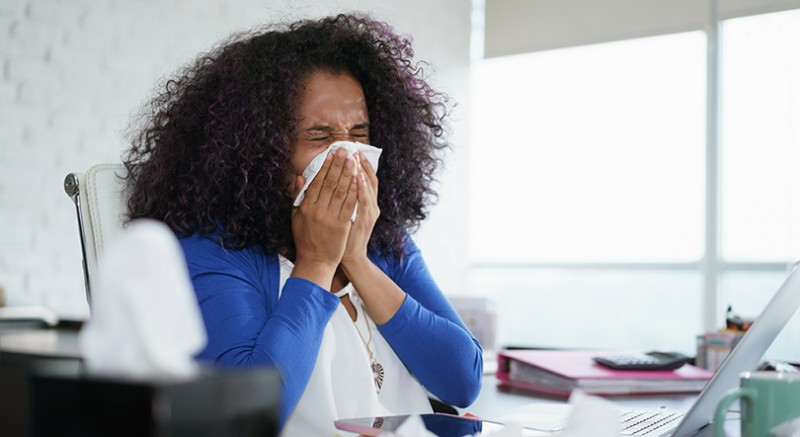Spring is in the air. So is a lot of pollen as well as other allergens that, for many people, produce the familiar and oh-so-annoying seasonal allergy symptoms of itchy, watery eyes, sneezing, and the occasional nasal drip typically accompanied by scratchy cough. Perhaps some congestion and skin reactions as well. It's almost like clockwork: trees start blooming, flowers start budding, homeowners get busy mowing their yards, and next thing you know you're at the pharmacy buying antihistamines and eyedrops. Seasonal allergies are here. Every year at this time; spring has its version and fall will get its in a few months.
What Causes Seasonal Allergies?
Also known as hay fever and, in more medical terms, allergic rhinitis, per Mayo Clinic, seasonal allergies affects millions of Americans. One strange twist in all this is it's easy to wonder where your immune system is when all this is going on – why isn't it doing its job in protecting you from this misery? Well, actually, it is doing its job, and doing it too well. Per health.usnews.com, your immune system is overreacting to a trigger or allergen – pollen seems to be a common culprit. Any time a person susceptible to allergies comes in contact with such a trigger, the immune system goes into overdrive, releasing histamine, a chemical that induces the allergic reaction and all those troublesome symptomsHow Do Antihistamines Work?
According to the Centers for Disease Control and Prevention (CDC), there's really no way to prevent allergies themselves, but the allergic reactions and symptoms can be stopped. Numerous medications available on the market – both via prescriptions and those sold over the counter – have been shown effective in thwarting the body's release of histamine and alleviating the symptoms. Many, though, can produce side effects, with drowsiness among the more common symptoms. One suggestion often made by experts for dealing with allergies is to keep your windows and doors closed during allergy season to keep allergens out (as much as possible). That preventive strategy apparently works well, as attested to by this blog's writer, who typically suffers from spring allergy symptoms for three or four weeks every year. This year, he had already been beset with allergy symptoms when he started noticing them greatly subsiding while being sequestered in his home during the coronavirus stay-at-home period ordered by his state's governor. However, on those days he went outside for a brisk walk of 30 to 40 minutes (while keeping proper social distance), allergy symptoms would return within several hours after he was back indoors. So he would again stay inside for two to three days, and symptoms would again significantly subside within 24-36 hours. In other words, there is hope for all of us seasonal allergy sufferers.8 Home Remedies for Seasonal Allergies
Following are eight other tips, suggestions, and remedies that could help stave off seasonal allergy's sting. First, though, if you suffer from seasonal allergies, consider seeing an allergist to get a skin test for the various allergens that could be problematical for you.- Local honey. Local to you, that is, wherever you might be. Bees create honey that likely contains trace amounts of the same pollen near where you live that is producing allergy symptoms in locals. Ingesting local honey might not help with symptoms immediately, but consider taking a tablespoon or two a day starting about a month out from when you normally collide with seasonal allergy season. Look for bee pollen products as well.
- Probiotics. Per truhealthmedicine.com, fermented foods such as kimchi and kombucha, which are abundant with probiotics, can help balance out your immune system in helping to ward off or at least tamp down allergy symptoms.
- Quercetin. A substance found in such foods as apples, berries, red grapes, and red onions, quercetin is an antioxidant proven effective in reducing skin reactions also related to allergies, per verywellhealth.com.
- Wear a mask. People worldwide have gotten accustomed to this in recent months because of the coronavirus pandemic. You no longer have to feel self-conscious wearing one. In terms of dealing with seasonal allergies, masks such as the N95 respirator mask that cover your mouth and nose can help prevent allergens from getting into your airways, such as when vacuuming or working in the yard, per webmd.com.
- Turmeric. This common spice, also readily available in supplement form, contains curcumin. This substance has been shown in various studies, as cited at health.usnews.com, to be successful in inhibiting allergic responses. One such study referenced by National Institutes of Health (NIH) https://www.ncbi.nlm.nih.gov/pubmed/27789120 tracked 214 people with allergic rhinitis and found that those who took curcumin for two months saw a reduction in sneezing and congestion, and improved airflow, compared to those participants who took a placebo.
- Garlic. Not only is garlic an anti-inflammatory and immunity booster, it contains quercetin, mentioned earlier here for its potent ability to improve allergy symptoms, per health.usnews.com.
- Stinging nettle leaf. This is a perennial flowering herb used for medicinal purposes dating back to ancient Greece, per health.usnews.com, and is singled out for its powerful anti-inflammatory properties. Seasonal allergy symptoms have an inflammatory component, making this herb a worthy foe to rhinitis.
- Nasal sprays. Such sprays containing sodium-based compounds can alleviate allergy symptoms without side effects, per Mayo Clinic.

